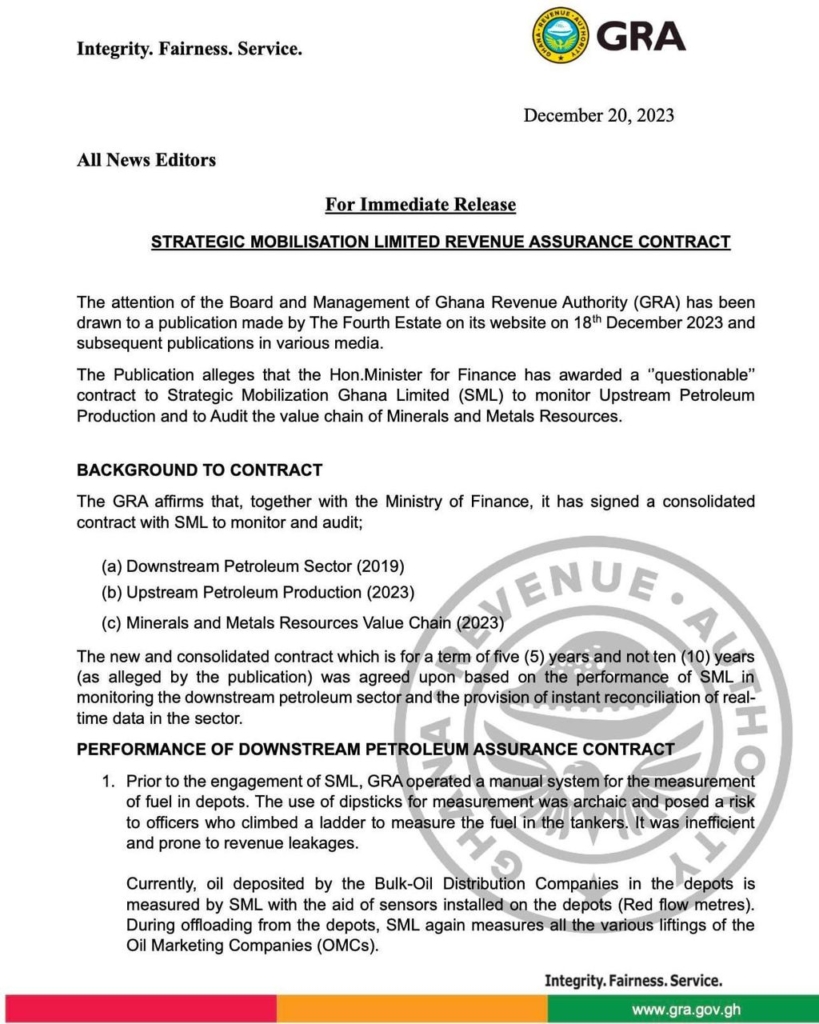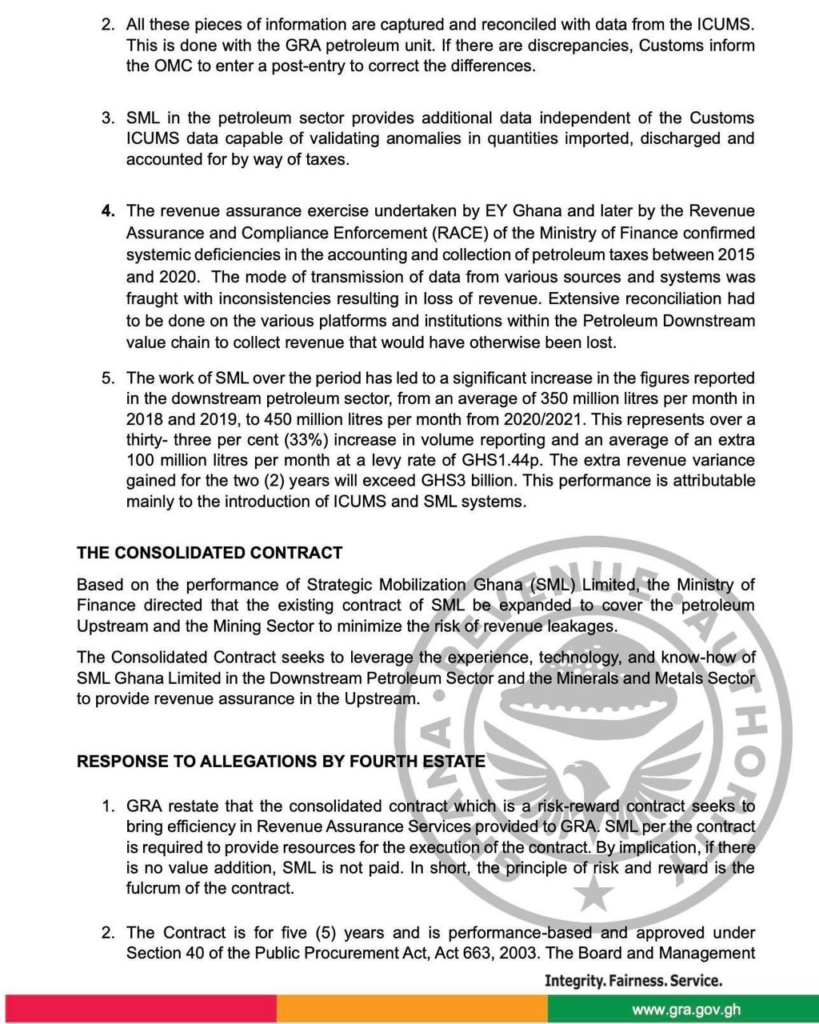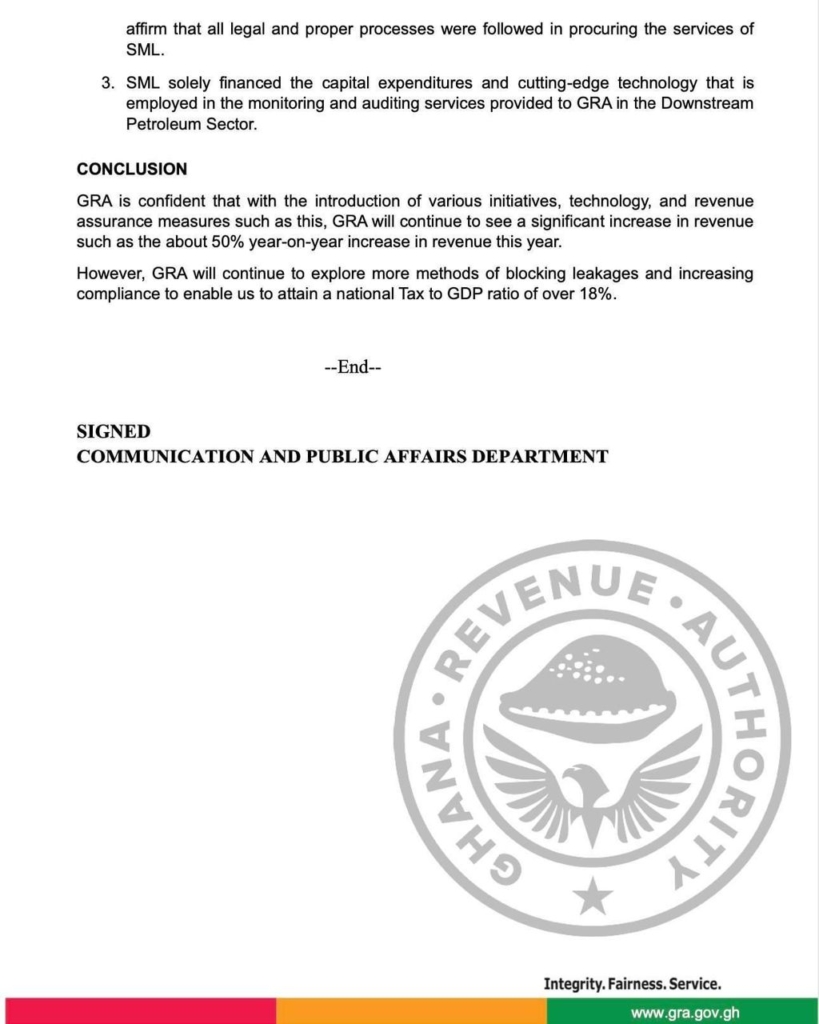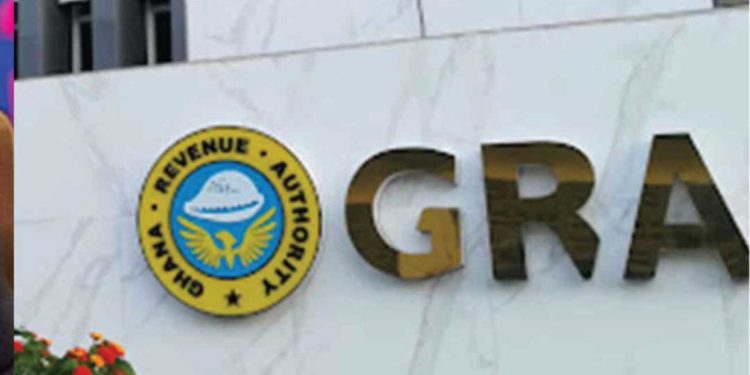GRA clarifies contract details with SML amidst controversy
GRA will continue to explore more methods of blocking leakages and increasing compliance to enable us to attain a national Tax to GDP ratio of over 18%”, the statement ended.
In a bid to set the record straight, the Ghana Revenue Authority (GRA) has vehemently refuted claims by media outlet ‘The Fourth Estate’ regarding a purportedly “questionable” contract with Strategic Mobilization Ghana Limited (SML).
Clarifying the specifics, GRA, in tandem with the Ministry of Finance, underscored that their engagement with SML encapsulates a five-year mandate. This duration contrasts sharply with the decade-long timeframe highlighted by ‘The Fourth Estate’.
In a statement, the GRA affirmed that, together with the Ministry of Finance, it signed a consolidated contract with SML to monitor and audit Downstream Petroleum Sector in 2019, Upstream Petroleum Production in 2023, and the Minerals and Metals Resources Value Chain in 2023.
The rationale behind this contractual alignment, GRA elucidated, stems from SML’s commendable track record, particularly its prowess in proffering instantaneous data reconciliation within the downstream petroleum sector.
“The new and consolidated contract which is for a term of five years and not ten years as alleged by the publication and was agreed upon based on the performance of SML in monitoring the downstream petroleum sector and the provision of instant reconciliation of real-time data in the sector”, the statement signed by the Communication And Public Affairs Department of the GRA said.
Cataloguing the Performance of the Downstream Petroleum sector under the Assurance Contract, the GRA, said before the engagement of SML, the authority operated a manual system for the measurement of fuel in depots.
According to the GRA, the use of dipsticks for measurement was archaic and posed a risk to officers who climbed a ladder to measure the fuel in the tankers.
“It was inefficient and prone to revenue leakages. Currently, oil deposited by the Bulk-Oil Distribution Companies in the depots is measured by SML with the aid of sensors installed on the depots (Red flow metres). During offloading from the depots, SML again measures all the various liftings of the Oil Marketing Companies (OMCs)”.
Historically reliant on rudimentary methods, GRA’s erstwhile manual system for fuel quantification has undergone a transformative shift. SML’s intervention has ushered in a new era of precision, leveraging cutting-edge sensors to obviate erstwhile revenue seepages and operational inefficiencies.
This robust data framework ensures synchronization with the Integrated Customs Management System (ICUMS). Any incongruities therein are promptly addressed, fortifying the system’s integrity.
The GRA continued that the revenue assurance exercise undertaken by EY Ghana and later by the Revenue Assurance and Compliance Enforcement (RACE) of the Ministry of Finance confirmed systemic deficiencies in the accounting and collection of petroleum taxes between 2015 and 2020.
“The mode of transmission of data from various sources and systems was fraught with inconsistencies resulting in loss of revenue”, the statement said, adding that “extensive reconciliation had to be done on the various platforms and institutions within the Petroleum Downstream value chain to collect revenue that would have otherwise been lost”
It emphasised that the work of SML over the period has led to a significant increase in the figures reported in the downstream petroleum sector, from an average of 350 million litres per month in 2018 and 2019, to 450 million litres per month from 2020/2021.
This, it said, represents over a 33% increase in volume reporting and an average of an extra 100 million litres per month at a levy rate of GHS 1.44.
Financially, the GRA posits that this collaborative synergy with SML has precipitated an incremental revenue influx exceeding GHS 3 billion. Such windfalls, GRA contends, are largely attributable to the synergistic confluence of the ICUMS and SML systems.
The GRA stressed that the consolidated contract which is a risk-reward contract seeks to bring efficiency in Revenue Assurance Services provided to GRA.
By this, it said, SML per the contract is required to provide resources for the execution of the contract. By implication, if there is no value addition, SML is not paid.
“In short, the principle of risk and reward is the fulcrum of the contract. The Contract is for five (5) years and is performance-based and approved under Section 40 of the Public Procurement Act, Act 663, 2003. The Board and Management affirm that all legal and proper processes were followed in procuring the services of SML”.
It disclosed that SML solely financed the capital expenditures and cutting-edge technology that is employed in the monitoring and auditing services provided to GRA in the Downstream Petroleum Sector.
“GRA is confident that with the introduction of various initiatives, technology, and revenue assurance measures such as this, GRA will continue to see a significant increase in revenue such as the about 50% year-on-year increase in revenue this year.
However, GRA will continue to explore more methods of blocking leakages and increasing compliance to enable us to attain a national Tax to GDP ratio of over 18%”, the statement ended.
Read details of statement below;





